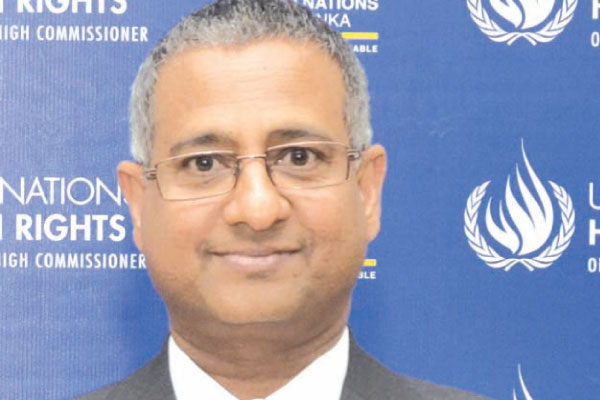A top United Nations’ official probing religious freedom issues has blamed “deeply rooted identity politics” and politicians’ manipulation of religion as undermining inter-religious harmony and peace in Sri Lanka. Briefing news media at the end of his 12-day-long study tour of Sri Lanka, UN Special Rapporteur on Freedom of Religion or Belief Ahmed Shaheed said that he had heard concerns being expressed that “some politicians intentionally instrumentalize religions, possibly for political gain, especially during elections”. Shaheed will present a report with his conclusions and recommendations to the Human Rights Council in Geneva in March 2020.
Presenting his preliminary findings at a press conference at the UN Compound in Colombo yesterday, the UN Special Rapporteur said the deeply rooted identity politics in Sri Lanka “undermine all the peace-building, coexistence and religious tolerance or harmony projects”.
Referring to the findings of the Parliament Select Committee on Communal and Religious Harmony headed by Speaker Karu Jayasuriya, Shaheed observed that a considerable amount of the blame for ethno-religious tensions goes “..to politicians of all political parties, creating and instrumentalizing communal disharmony in an attempt to strengthen their power bases”.
“The country is moving towards elections and I would hope that there is commitment across all parties to stand up for the rights of everybody and foster inclusion and promotion of solidarity of all communities. In order to counter the extremism, you need to have rule of law well protected. Regardless who is in office, the people will suffer if there is no commitment across the board, from the top to the bottom, to ensure the rule of law and end impunity,” he commented.
The UN Special Rapporteur also highlighted that the Muslim Marriage and Divorce Act (MMDA), which is based on patriarchal readings of sharia, “…violates international human rights standards including those articulated by the UN Convention on the Elimination of all Forms of Discrimination Against Women (CEDAW)”.
“However, the long-awaited reform of the MMDA has started to progress recently. I have not seen the Cabinet paper that has recently been endorsed, but I have seen the proposals in that regard. I hope the final version of legislation will include the equality for Muslim women in terms of the age of marriage and other rights to marriage and divorce. I also hope Muslim women will have the access to tribunals to act as Quazi judges,” he remarked. Presenting his recommendations for immediate consideration, Shaheed stressed that the State must prosecute those responsible for violence and incitement to violence, make efforts to dismantle the networks of hate, and facilitate access to justice to victims of hate crimes.
“The long-standing traditions of religious harmony and co-existence in Sri Lanka must be reinforced to address the challenges of the modern context of the country. This is characterized by growing politicisation of religion, and polarization of communities through segregated education based on ethno-religious identity. Opening up of under-regulated spaces for communication through privatised electronic media and spread of social media, simmering resentment against perceived majoritarian privilege, growing frustration over capricious law enforcement, and the spread of religious extremism are also contemporary challenges in Sri Lanka,” he pointed out.
“Government leaders and religious leaders must speak out against hateful narratives and reject efforts to ostracise and stigmatise minority communities and persons in vulnerable situations. Urgent reforms to the education system must be initiated to foster inclusive identities. The social media platforms should invest more in the ability to monitor and respond to incitement to violence while protecting freedom of expression and access to information,” he added.
“Although inciting to discrimination, hostility and violence is criminalized under the ICCPR Act, many argued that the Act was not applied in a manner that would protect minorities against incitement,” he remarked also adding, “I heard examples of some arrested under the ICCPR Act for seemingly trivial reasons (a fictional story, a symbol in a dress) that were deemed to provoke ‘religious disturbance’, while I heard of impunity for serious incidents of incitement to violence such as those that led to the Aluthgama riots in 2014”.
“The Muslim communities have faced increased hostility especially after the April bombings. Prior impunity has strengthened the anti-Muslim groups. Weak and un-coordinated responses to anti-Muslim violence have seen the rise in violence and attacks on individuals and the communities in some parts of the country,” he noted.
The UN Special Rapporteur also expressed concerns on the problems faced by the Muslim women in religious dress codes when entering public institutions and when using public transport. He however pointed out that ban on face veil had come to an end with the lapse of State of Emergency.
Shaheed travelled to the Northern, Eastern, Central and North Western Provinces in addition to Colombo. He met with Speaker Karu Jayasuriya, Opposition Leader Mahinda Rajapaksa, and Foreign Affairs Minister Thilak Marapana among others. In his field visits, he met with representatives from different religious communities, civil society organizations and research institutions.
(Daily News)

